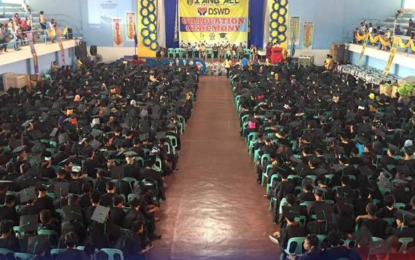
Pantawid Pamilyang Pilipino Program graduates (DSWD file photo)
MANILA – The Department of Social Welfare and Development (DSWD) has reaffirmed its commitment to intensify the agency’s efforts in providing social protection programs and services following the World Bank’s (WB) recent report that the Philippines still lags behind regional peers in human capital development.
“Social protection plays an important role in boosting human capital. As the lead social protection agency, the DSWD continues to improve its existing programs and establish new ones to better serve the Filipino people,” DSWD External Assistance and Development Assistant Secretary Juan Carlo V. Marquez said in a news release on Thursday.
Human capital as defined by the WB encompasses health, knowledge, skills, and experience acquired throughout one’s life stages. It is one of the main drivers of broad-based economic growth that translates into improvements in living standards.
According to the WB’s report titled “The Philippines Human Capital Review”, holistic services in the early years that include maternal and child health, nutrition, early education and stimulation, development of foundational skills, and social protection in the first 10 years are paramount “to ensure optimal start in life for every child as a foundation for boosting human capital.”
“The DSWD, in response to the key recommendation of WB to invest in the early years of a person, is prioritizing pregnant and nursing women in the agency’s programs and services to improve their nutritional status and to address the malnutrition of infants and young children,” Marquez said.
Pantawid Pamilyang Pilipino Program
The DSWD has recently announced that it will expand the cash grants for pregnant and nursing women who are beneficiaries of the Pantawid Pamilyang Pilipino Program (4Ps) to improve the nutrition and health of children and mothers in their first 1,000 days.
“By adding additional grants for pregnant and nursing women, the DSWD aims to mitigate malnutrition and stunting among children that will result in optimal child development,” Marquez pointed out.
The WB report acknowledged the 4Ps as one of the government’s human capital initiatives responsive and supportive to the transformative agenda of the Philippine Development Plan (PDP) 2023-2028.
The 4Ps is the national poverty reduction strategy and human capital investment program that provides conditional cash transfer to poor households, for a maximum period of seven years, to improve the health, nutrition, and education aspects of their children.
From 2016 to April 30, 2024, more than 32,000 former monitored children of the 4Ps have successfully completed their tertiary education.
Of the total number of college graduates of the 4Ps program, more than 6,000 passed their respective board examinations, making them licensed teachers, engineers, architects, and midwives, among others.
“These individuals are a living testament that government programs, especially the 4Ps, can contribute to the improvement of health, nutrition, and education of Filipino children, giving them opportunities to thrive and eventually contribute to nation-building,” Marquez said.
Tara, Basa! Tutoring Program
Another DSWD innovation is the Tara, Basa! Tutoring Program, which engages 2nd to 4th-year college students of low-income families and capacitates them to become tutors and Youth Development Workers (YDWs).
“The DSWD’s Tara, Basa! Tutoring Program is the reformatted educational assistance of the DSWD which aims to help and provide assistance to college students from low-income families who are in difficult situations while contributing to the improvement of reading proficiency among incoming Grade 2 students,” Marquez said.
Tutors and YDWs receive cash assistance from the DSWD through a cash-for-work scheme, in exchange for their rendered service. As tutors, college student beneficiaries conduct reading tutorial sessions to help elementary students who are either struggling or non-readers.
The YDWs conduct Nanay-Tatay teacher sessions for parents and guardians on effective parenting.
Walang Gutom 2027: Food Stamp Program
Another innovative program of the DSWD that aims to address malnutrition among children is the Walang Gutom 2027: Food Stamp Program (FSP).
“We believe that this program can address the gaps and assist its beneficiaries in attaining the recommended food and energy consumption needed for each member to perform their daily tasks and routines that have a direct and indirect contribution to human capitalization and a direct positive impact toward nation-building,” the DSWD co-spokesperson said.
FSP beneficiaries are provided access to monetary-based assistance in the form of an Electronic Benefit Transfer (EBT) card, which will be loaded with food credits amounting to PHP3,000 per month.
These food credits can be used to purchase a combination of various nutrition-rich food items from DSWD-accredited partner retailers.
The Walang Gutom 2027: Food Stamp Program also invites beneficiaries to become productive citizens through skills training and participation in government-organized job fairs.
Attendance to the monthly Nutrition Education Sessions is one of the conditions for FSP beneficiaries that teach them how to prepare healthy and safe meals for the family.
Supplementary Feeding Program
The Department also undertakes the Supplementary Feeding Program (SFP) which provides food to children aged 3-5 years who are currently enrolled in Child Development Centers (CDCs) and children aged 2-4 years in Supervised Neighborhood Play (SNP).
The program, which uses indigenous or locally-produced food equivalent to 1/3 of Recommended Energy and Nutrient Intake (RENI), aims to improve the knowledge, attitudes, and practices of children, parents, and caregivers through intensified nutrition and health education and, improve and sustain the nutritional status of children-beneficiaries.
As of March 30, some 1,559,459 children have benefited from the SFP for the 13th Cycle which covers the school year (SY) 2023 to 2024. (PR)
